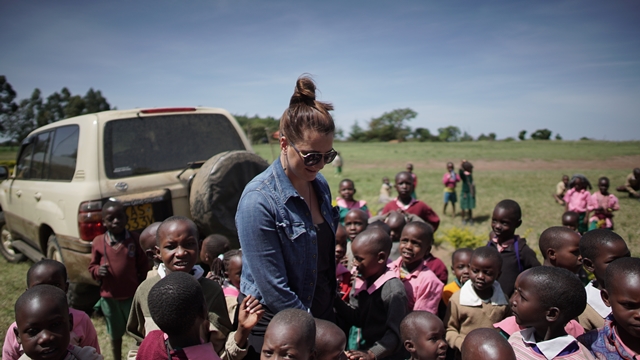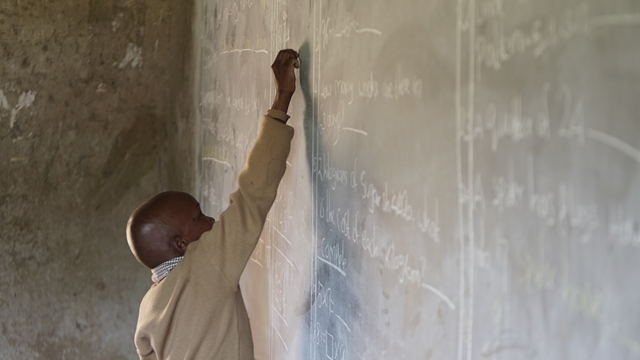Saks Fifth Avenue at Biltmore Fashion Park recently partnered with Coomi Fine Jewelry for an evening of shopping to benefit The Cora Blue Fund, a nonprofit organization based in Kenya focused on improving conditions for girls of the Maasai Tribe. AZFoothills.com chatted with Janyne Preston of The Cora Blue Fund to discuss its mission and its future goals.
AFM: Tell me about your decision behind your charity career and the calling of your work?
JP: When Abbi was 14, we started going to medical mission trips in Kenya near an area outside of the Maasai Mara. Every year after this we would return on Medical Mission trips to the same area to help contribute to the community, we saw a real need for education and girls education in particular, so we decided then to invest in education of Maasai women, and I knew that Abbi had a calling and was always drawn to that area, so I decided that was the place that she needed to be.
AFM: Why this cause? Any personal ties?
JP: I think that when Abbi turned 14, it was her real first experience in global giving, and that’s how we kind of worked our way into it. The Massai people are such a warm and giving and wonderful tribe, and they are just so friendly and happy with their circumstances as is and to be able to enhance that without changing the culture is important.
AFM: What was the inspiration behind the Cora Blue Fund, and how did you get started?
JP: The Cora Blue fund was named after Abbi’s grandmother, Cora Blue Preston, and she’s a wonderful giving loving woman who was a nurse, and has always been such a blessing to other people, and we wanted to carry on her tradition of giving, and caring for other women and people.
AFM: Since you moved to Kenya full-time to pursue Cora Blue Fund, how has expansion been? Any recent developments?
JP: There have been a lot of exciting expansion opportunities. We first started raising money for a dam because there was no fresh water at the school. Because we received so much attention on that, the government decided to provide water to the school, which is exciting because now we can focus more on other projects. All the buildings of the school are 30 plus years old, so now we can focus our attention on that.
AFM: Since establishing the Cora Blue Fund, the main objective or goal has been to build a damn to provide clean reliable water for the children of the Maasai Tribe. What is the progress on this, and how can we continue to help this project?
JP: There are some exciting this happening because the government has decided to help provide this, so now we are going to do the piping and water tanks, so we are still currently raising money for this. In this area, they can experience longs periods of droughts, so there are periods of time they may have to walk 3 to 4 miles just to get to a pile of dirty water for their needs. That’s cooking, drinking, bathing and washing that comes from these dirty puddles. Because of this, we having ongoing needs filtering systems because they need clean and fresh water. At Cora Blue, we are also committed one hundred percent of the proceeds go to the charity.
AFM: Where do you see your organization a year from now?
JP: The first project will be building a boys' room, that will be breaking ground in January, and will house approximately 250 boys. This will be the very first of its kind with flushing bathrooms, and it is an exciting project because it will show the community a different standard and a different way to live. The second project is another new project of its kind--a secondary school in which the Maasai tribe can learn a trade such as electricity, sewing, waitressing, anything that can give them sources of income. As of now, their only sources of income are jewelry making and shepherding. We really want to provide them with pathways to success.
AFM: How can contributions continue to benefit this project after this event?
JP: You can always go to thecorabluefund.com and on Instagram and Facebook, we have many facets of this project that are ongoing. There are really so many ways to help, even small donations help. We currently have a project in which we learned there are 250 children in the school who don’t eat during a 12- to 13-hour day. We have negotiated with the food providers so we can figure out how to feed the kids for one year for just $100. This means even a donation of $20 can last for a very long period. One-hundred percent of all the proceeds will go to this cause.
AFM: Anything else you want to add?
JP: I think one of the most exciting things is we look at this project and we are a little overwhelmed at just the basic needs. Food, shelter, education, safety for the girls, especially from pre-arranged marriages and female genital mutilation. Those things have been important to us. Those are the things we are striving to provide. Again, every donation small or large is greatly appreciated and goes a long way. We also have a GoFundMe account that is linked right from our web site and Instagram account.

